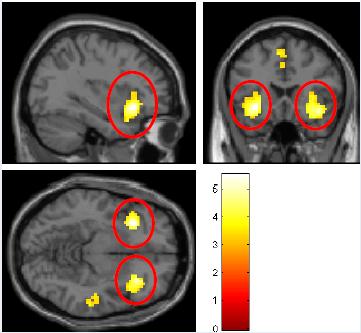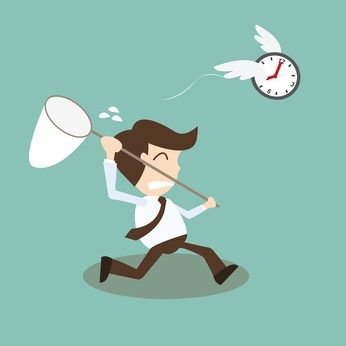Perception of Time: How does our feeling for time emerge - Part 3

After a biological clock, which controls our time experience in a second or minute range, brain researchers have been searching for a long time. New insights show, that our physical feeling plays a central role: Self-Perception and time experience are inseparably connected to each other.
This is the third part of this article series. If you have missed some parts, don't forget to catch up on it:
- Perception of Time: How does our feeling for time emerge - Part 1
- Perception of Time: How does our feeling for time emerge - Part 2
How does our feeling for time emerge - Part 3
Slow motion effect at moment of shock
Recently more and more results acquired from image processing procedures were introduced, which assign a dominant role to the Insula regarding time experience. It is well known, that time estimate is dependent on emotional and physical influences. In moments of shock a type of slow motion effect is taking place, seeming to slow down processes in the outside world. This is contingent on a stronly increased higher level of excitement in a "Fight-or-flight" situation, whereby psychologic and mental processes comperatively run faster. The whole organism is directed towards a preferably quick survival reaction.

Likewise fever slows down subjectively felt impression of time. Once the wife of the American physiologist Husdon Hoadland in the beginning of the year of 1930 was lying in her bed with temperature, he noticed that she often overestimated the duration of his absence. He treated her with easy exercises, in which she had to determine given timespans. Thereby she was systematically telling very high values, because of counting seconds too fast. Hoaglands theory: By means of higher physiological activity when having fever the biological clock is running faster, which lets you subjectively feel time as being stretched.
According to a lot of experimental studies of the last decade, strong emotions have a similar effect. If subjects are presented with images of negative or positive content - f.e. images of injured people or erotic scenes - they guess the duration of the time elapsed to be longer compared to looking at neutral images. Again the common interpretation is, that increased physiological level of excitement is stretching time.
How can this effect be explained? In addition to this, cognitive scientists developed models of time perception, in which a hypothetical time emitter sends out impulses of specific frequency, which are received by an accumulator. The more impulses the latter is registering over a given period of time, the longer the subjective duration is. Two mechanisms determine the quantity of the received impulses (the subjective time). On one side the before mentioned effect of attention: When you are distracted the accumulator is receiving less impulses. The time period seems to be shorted. Whereas we are streching time while we are waiting and thereby focusing strongly on time, because more impulses are being collected. On the other side the level of attraction is modulating the time emitter: While physical activation is intensified, clock frequency is increased. Therefor more impulses can find their way to the accumulator. This explains the effect of emotional situations.
According to new scientific results, the theoretically postulated impulses in the cognitive model could in fact be physical signals. An increased higher attention to oneself, f.e. while waiting, leads to stronger perception of physical signals - which stretches time subjectively. In emotional situations of increased physical activation level, we can observe the same effect. Also when you look at a time interval retrospectively, physical perception has an effect on it. This was shown by a study from Olga Pollatos from the University of Ulm (Potsdam, Germany) and her colleagues from Freiburg in the year of 2014, in which the subjects overestimated a 45 seconds lasting Horror-Video-Clip regarding its duration. This was especially the case, when they were told to pay attention to their physical reactions.
In this attempt a group of participants firstly watched three different kinds of videos with different emotional content: a funny cartoon, an objective documentary scene and the before mentioned horror scene. All clips had a length of exactly 45 seconds and were presented to the people in different sequences, to exclude any possibly emerging sequence effects. Before the presentation started, the examiners were telling the participants to watch out for details in the clips, about which they would be questioned later. Only after the test, the subjects were asked to estimate the duration. So in this case it was all about a truly retrospective time judgement. Result: The participants stated the horror clip to be longer and the cartoon clip to be shorter compared to the documentary. This complies to the known saying:
Time flies when you're having fun.
In a second part of the test, different participants had to explicitly pay attention to their own physical reactions while watching the same three video clips. This focus on interoception leaded to an even stronger overestimation regarding the duration of the horror clip. The intensified perception of physical processes was stretching time further.
A study carried out by Karin Meißner at the Ludwig-Maximilians-University in Munich in the year of 2011 let us assume, that the heart beat is playing a major role in the estimation of time duration. In a first exercise, subjects had to complete a so called Heart-Beat-Estimation-Test, by estimating the amount of heart beats within a given interval of f.e. 45 seconds, without any accessories like the pulse of the finger. Only by trying to feel into yourself. Meanwhile electrodes were recording the actual amount of heart beats. The participants, that were able to estimate their heart beat count in a more precise way, were also the ones who were doing easier in estimating time duration while doing the test. Concerning this, the research from Hugo Critchley and his colleagues of the English University of Sussex is interesting. Through functional magnetic resonance tomography (MRT) it could be proven, that the accuracy of perception of heart beat is correlating with activities in the Insula.
Perception of time, body awareness, feelings and the insular lobe are tightly connected to each other ...


Great post, upvote
Thank you!
This post has received a 4.84 % upvote from @booster thanks to: @n3bul4.